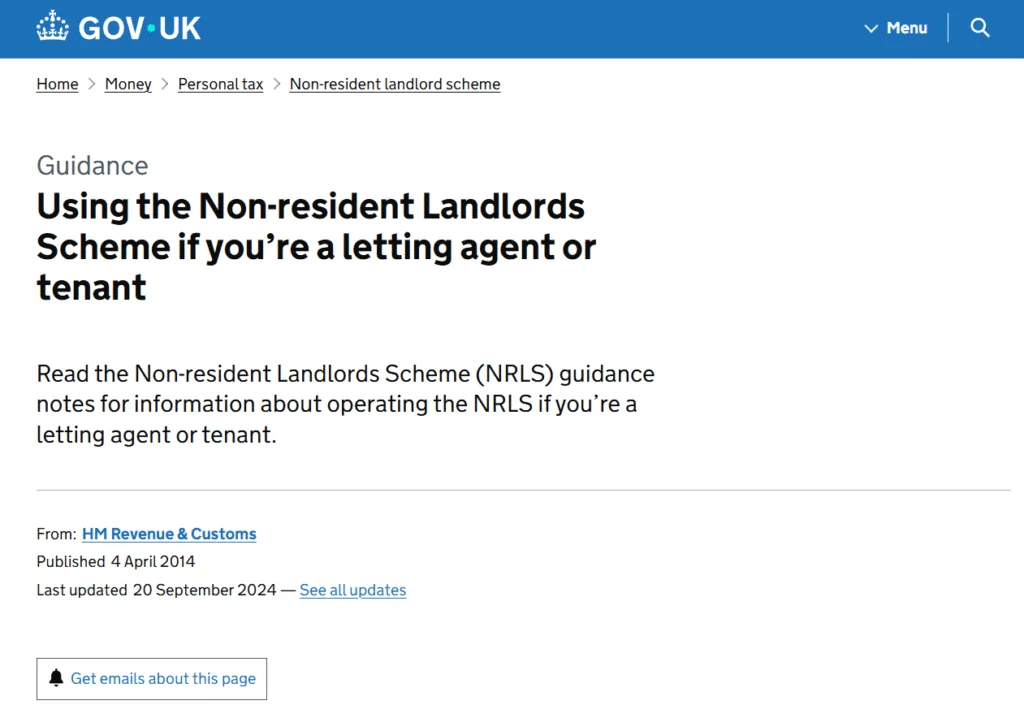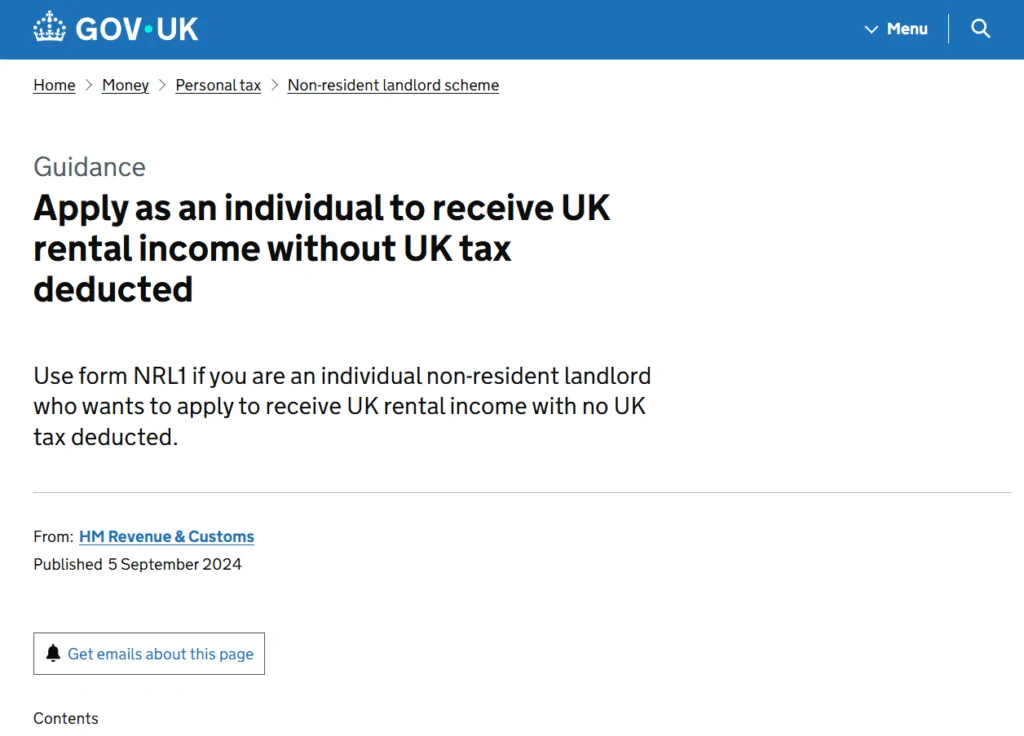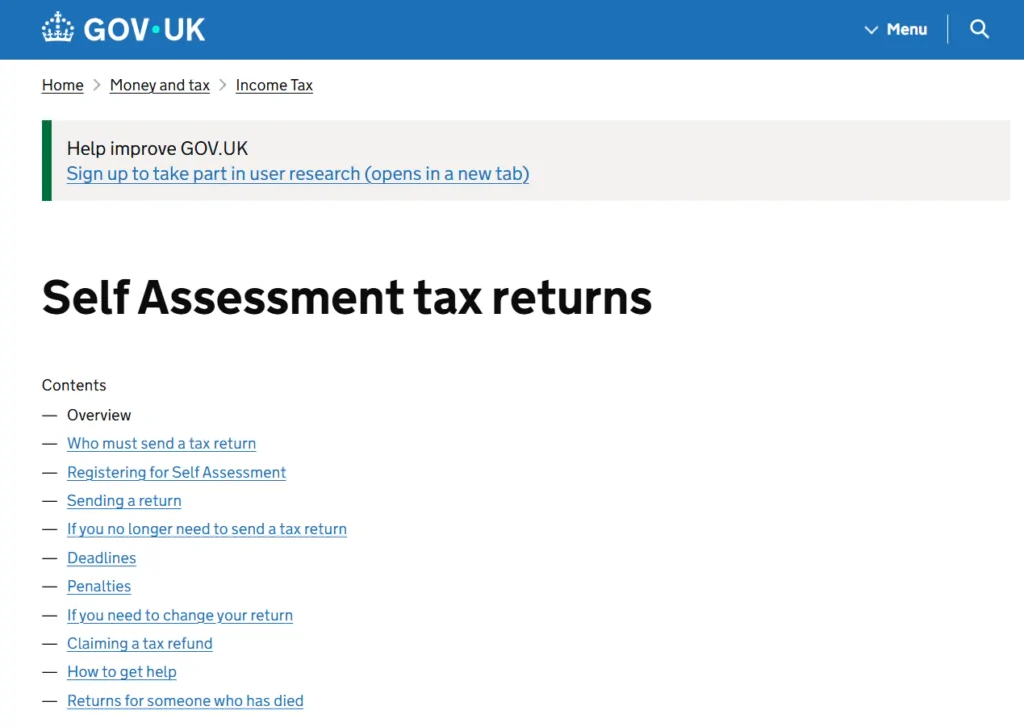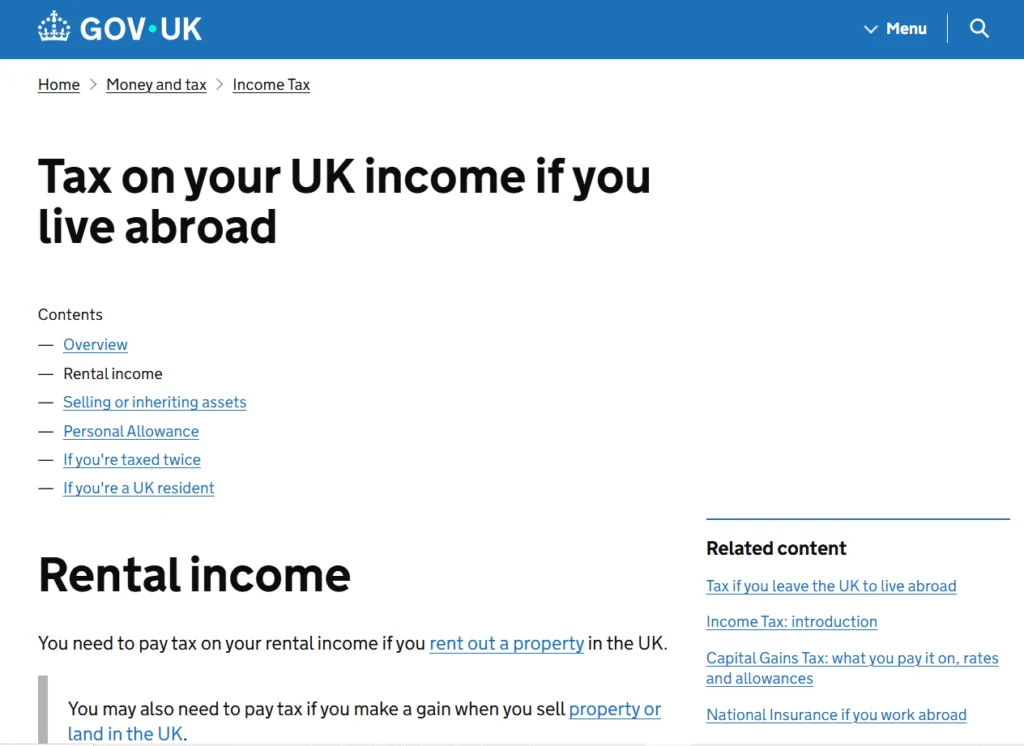HMRC NRL1 Form – Full Guide to the Non-Resident Landlord Scheme, How NRL1 Works, and How to Register as an Overseas Landlord
Understanding the HMRC NRL1 Form
The NRL1 form is the official HMRC form used by overseas landlords to register for the Non-Resident Landlord Scheme (NRLS). This scheme ensures the correct tax is paid on rental income from UK property when the landlord lives abroad for more than 6 months per year.
The NRL1 form allows overseas landlords to apply to:
-
Receive UK rental income without tax deducted at source, OR
-
Register with HMRC so that letting agents or tenants deduct the correct tax (if required)
Completing the NRL1 ensures compliance with UK tax law and helps landlords avoid incorrect deductions, penalties, or withholding.
This guide fully explains:
-
What the NRL1 form is
-
Who must complete it
-
How the Non-Resident Landlord Scheme works
-
Step-by-step instructions
-
How tax is deducted (or not deducted)
-
Letting agent and tenant responsibilities
-
Correcting mistakes
-
Common issues
-
HMRC checks and compliance
-
How Audit Consulting Group helps UK and overseas landlords
For comprehensive tax services, consider Overseas Tax Advice for non-UK residents provided by ACG.
What Is the NRL1 Form?
The NRL1 is an HMRC registration form for individuals who:
-
Own property in the UK
-
Rent out that property
-
Live outside the UK for more than 6 months a year
The purpose of the NRL1 is to inform HMRC that the landlord is non-resident and to determine how tax should be collected.
The form is used to request:
Permission to receive rental income gross (without tax deducted)
OR
Registration so HMRC can track rental income correctly
Without submitting NRL1, letting agents must deduct 20% tax before sending rental income to the landlord.
Who Must Complete the NRL1 Form?
You must submit the NRL1 if you are:
An individual landlord
(personal ownership)
Living outside the UK for more than 6 months
This includes:
-
British citizens living abroad
-
EU nationals with UK rental property
-
Anyone relocating overseas
-
Overseas workers
-
Long-term travellers
-
Digital nomads
Receiving rent from UK property
Even if:
-
You make a loss
-
You are repaying a mortgage
-
The tenant pays rent directly to you
Planning to leave the UK soon
If you expect to become non-resident within the next year.
Who Does NOT Need the NRL1?
-
UK residents renting UK property
-
UK companies owning UK property (use NRL2)
-
Non-resident companies (use NRL2)
-
Non-resident trusts (use NRL3)
-
Tenants who do not pay over £100/week
NRL1 is specifically for individual overseas landlords.
How the Non-Resident Landlord Scheme (NRLS) Works
The scheme ensures HMRC receives tax on rental income from UK property when the landlord is living abroad.
Two possible outcomes:
1. Landlord submits NRL1 → Receives rent WITHOUT tax deducted (gross payment)
When HMRC approves the NRL1:
-
Letting agent pays rent in full
-
No tax deducted at source
-
Landlord pays tax through Self Assessment
-
Landlord must submit annual UK tax returns
This is the preferred option for most landlords.
2. Landlord does NOT submit NRL1 → Tax is withheld (20% deduction)
If landlord does not register:
-
Agent must deduct basic-rate tax
-
Tenant must deduct tax if no agent and rent > £100/week
-
Tax is sent to HMRC quarterly
This usually reduces cash flow and causes incorrect deductions.
Letting Agent Responsibilities Under the NRLS
Letting agents must:
-
Register with HMRC if managing property for non-resident landlords
-
Deduct 20% tax unless HMRC issues approval letter
-
Submit NRLS quarterly reports
-
Provide annual NRLS certificates to landlords
-
Hold detailed rental statements
HMRC guidance for agents:
https://www.gov.uk/government/publications/non-resident-landord-guidance-notes-for-letting-agents-and-tenants-non-resident-landlords-scheme-guidance-notes
Tenant Responsibilities (If No Agent Is Used)
Tenants must deduct tax if:
-
They pay rent directly to an overseas landlord
-
Rent exceeds £100 per week
-
Landlord is outside the UK
-
No NRL1 approval exists
Many tenants don’t realise this and may accidentally break HMRC rules.
Audit Consulting Group helps correct mistakes.
How to Complete the NRL1 Form (Step-by-Step)
Step 1 – Confirm you are non-resident
Living outside the UK for over 6 months or intending to.
Step 2 – Gather required information
You will need:
-
Full name
-
Address abroad
-
National Insurance number (if applicable)
-
UK property address
-
Letting agent details (if any)
-
Date non-residence began
-
Passport or ID details
-
Tax residence country
-
Tax identification number (TIN) abroad
Step 3 – Complete NRL1 online or by post
Online form:
https://www.gov.uk/guidance/apply-as-an-individual-to-receive-uk-rental-income-without-uk-tax-deducted
Step 4 – Submit the form
Submission options:
-
Online
-
Email (in some cases)
-
Postal forms to HMRC
Step 5 – Wait for HMRC approval
Approval usually takes:
-
2–8 weeks
HMRC sends:
-
Confirmation letter to landlord
-
Copy to letting agent
Step 6 – Receive rent gross
Once approved, letting agents must stop deducting tax.
Documents Often Required (Varies by Situation)
HMRC may ask for:
-
Proof of overseas address
-
Copy of passport
-
UK property ownership evidence
-
Letting agent contracts
-
Residency certificate
-
Foreign tax identification number
-
Previous Self Assessment records
We help prepare all documentation.
What Happens After HMRC Approves the NRL1?
You receive rent without tax deducted
You must submit a UK Self Assessment tax return
You must declare rental income to HMRC annually
HMRC may review your file periodically
Even with NRL1 approval, you must still pay UK tax on profits.
Do You Still Need to Pay UK Tax With an NRL1?
Yes.
NRL1 approval only removes withholding tax.
You must still declare:
-
Rental income
-
Mortgage interest
-
Repairs
-
Service charge
-
Agent fees
-
Allowable expenses
When You Must File a UK Tax Return
Even if rent is paid gross, you must file Self Assessment if:
-
You rent a UK property
-
You make over £2,500/year profit
-
HMRC requires it
HMRC guidance:
https://www.gov.uk/self-assessment-tax-returns
How to Correct Errors on an NRL1
Common errors include:
-
Wrong dates
-
Incorrect residency status
-
Landlord returning to UK
-
Moving to a different country
-
Letting agent changes
-
Joint owners not both registering
Corrections are made via:
-
Additional NRL1 submission
-
Self Assessment adjustments
-
Direct written communication with HMRC
We manage all corrections on behalf of landlords.
Common Problems with NRL1 and NRLS
For Landlords:
-
Agents deduct tax despite approval
-
HMRC delays
-
Joint owners confusion
-
Not filing tax returns after approval
-
Tenants not deducting tax correctly
-
Duplicate HMRC records
For Agents:
-
Incorrect withholding
-
Missed NRLS quarterly reports
-
Penalties for non-compliance
-
Not updating systems after HMRC approval
For Tenants:
-
Failure to deduct tax
-
Not registering as responsible tenant
-
HMRC fines for non-compliance
Audit Consulting Group helps resolve all of these issues quickly.
Penalties for NRLS Non-Compliance
Penalties may apply to:
-
Landlords
-
Tenants
-
Letting agents
Common penalties:
-
Failure to deduct tax
-
Failure to file NRLS returns
-
Incorrect landlord status
-
Deliberate non-compliance
We help negotiate penalty reductions.
Case Studies
Case Study 1 – Landlord Overcharged Tax
Client: Sarah L., Dubai
Issue: Agent deducted tax for 18 months despite NRL1 submission.
Solution: We contacted HMRC; refunds issued through Self Assessment.
Case Study 2 – Tenant Didn’t Deduct Tax
Client: Tenant in Manchester renting directly from overseas landlord
Issue: Non-compliance under NRLS.
Outcome: We arranged disclosure and avoided penalties.
Case Study 3 – HMRC Held Application for 12 Weeks
We intervened, provided documents, and obtained approval.
Case Study 4 – Joint Ownership
Couple owned property together. Only one had NRL1 approval.
We submitted NRL1 for second owner → compliance restored.
Frequently Asked Questions (FAQ)
Q1: What is the NRL1 form?
Registration form for overseas landlords under the NRLS.
Q2: What happens if I don’t fill in NRL1?
Letting agents or tenants must deduct 20% tax.
Q3: How long does approval take?
Usually 2–8 weeks.
Q4: Do I still pay tax with an NRL1?
Yes — through Self Assessment.
Q5: Can I submit NRL1 before leaving the UK?
Yes.
Q6: Is NRL1 needed for short holidays abroad?
No — only if you live abroad for over 6 months.
Q7: Do joint owners each need NRL1?
Yes — every owner must apply individually.
Official HMRC information:
https://www.gov.uk/tax-uk-income-live-abroad/rent
NRL1 HMRC Non-Resident Landlord Form Services Cost UK
Submit the NRL1 HMRC form in the UK with expert support. We help non-resident landlords apply to receive rental income without tax deduction at source. Our NRL1 services ensure accurate applications and HMRC compliance.
Service Cost Estimation
Select the service category below to calculate the estimated cost of either accounting & tax services or forms and submissions.
Select Required Services / Forms
Select one or more services/forms to receive an accurate cost estimate. You can adjust your selection at any stage.
How would you like to engage our services?
Please select whether you require a one-off service or ongoing monthly support.
Contract Duration
Your cost estimate
Apply now and get 10% OFF
Submit your request today and receive an exclusive 10% discount on your selected service.
All prices are estimates. To receive a personalised quote, please fill out the form or contact us.
Ready to get started?
Get professional support from experienced UK accountants









